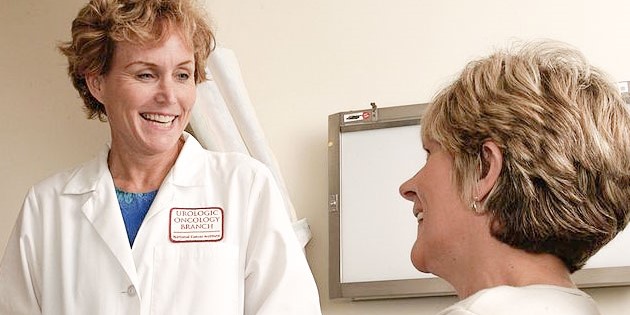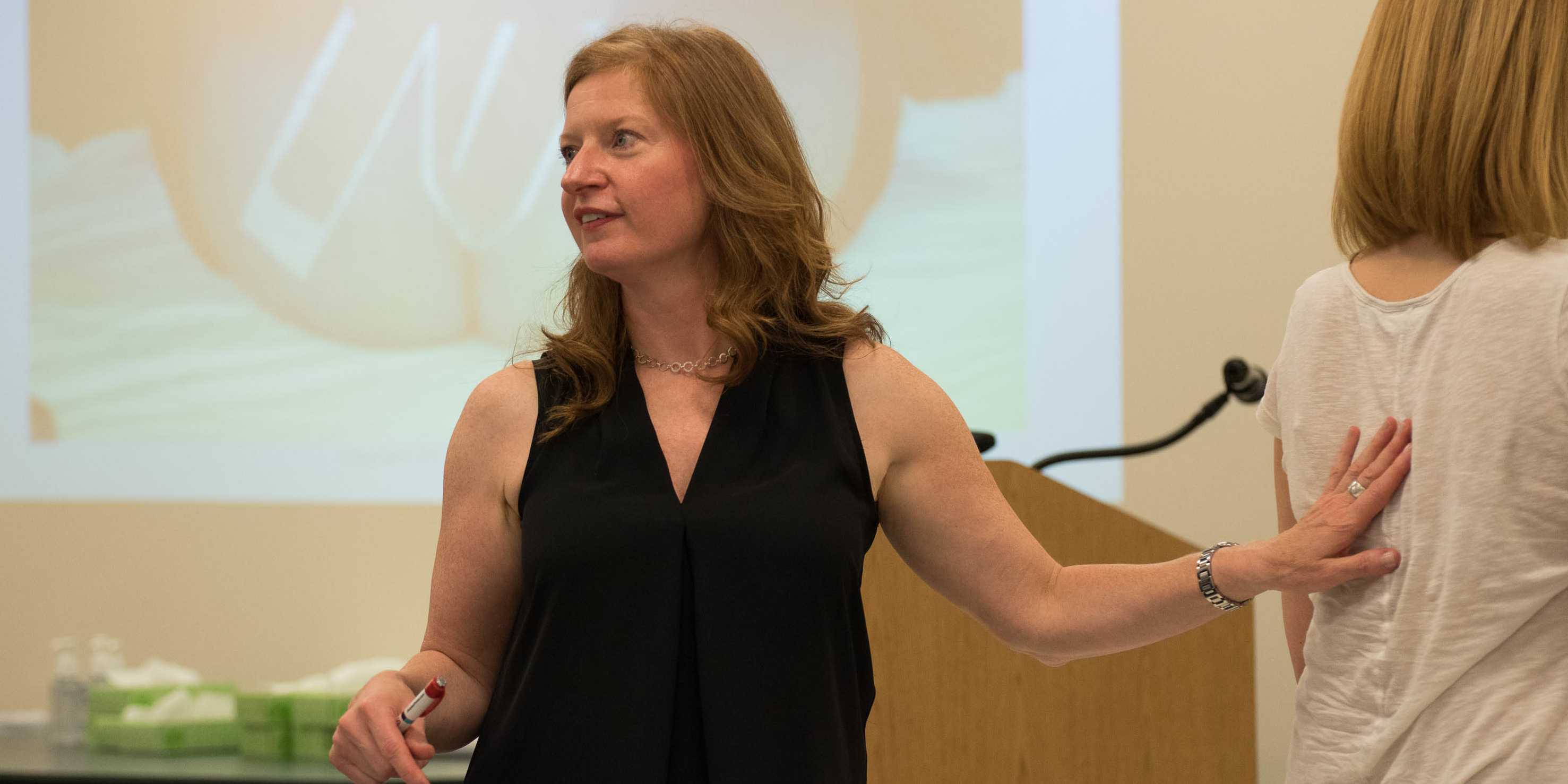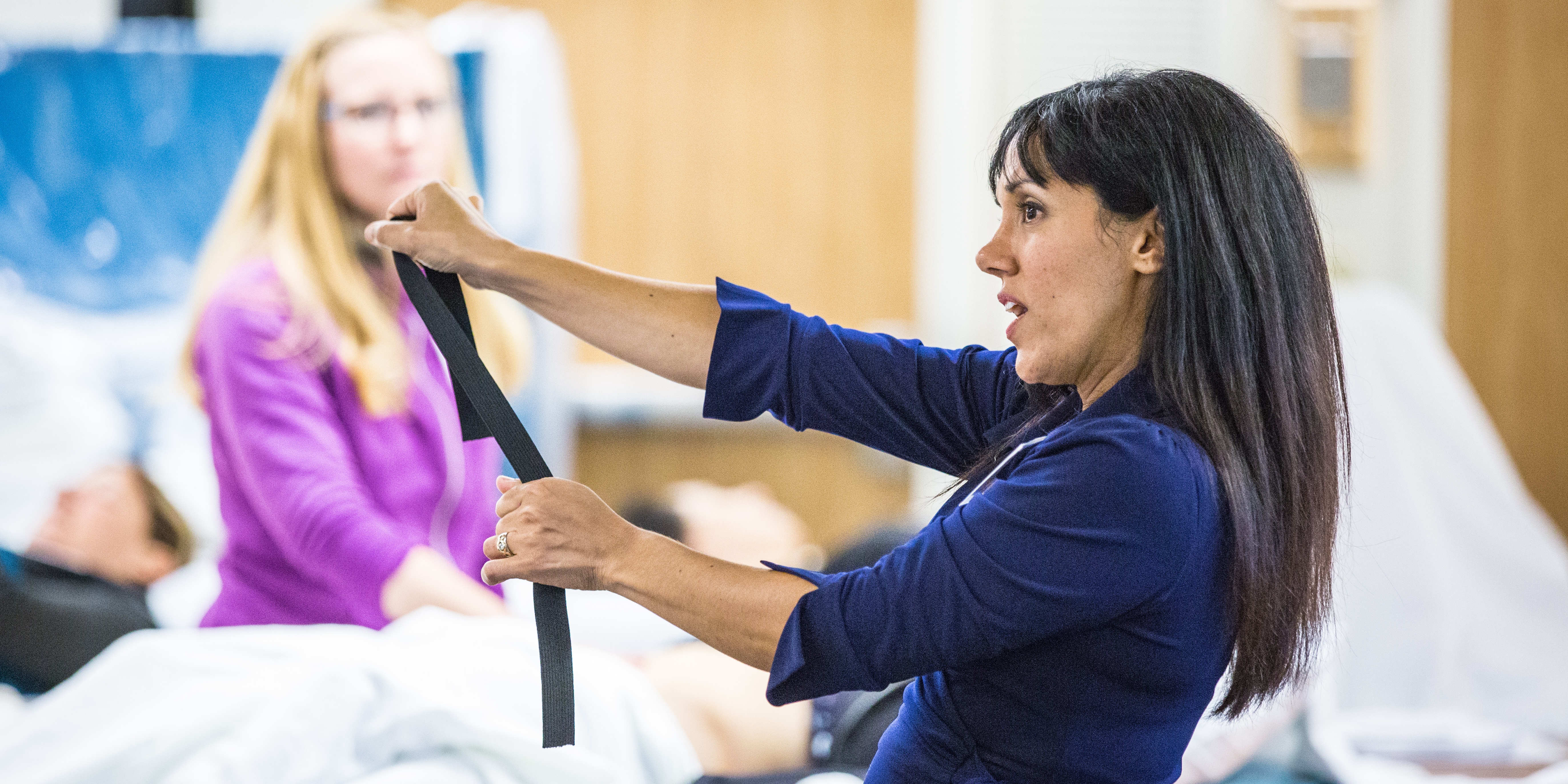Elizabeth Makous - Featured Certified Pelvic Rehabilitation Practitioner
In our weekly feature section, Pelvic Rehab Report is proud to present this interview with newly certified practitioner Elizabeth Ann Makous, MS, PT, CLT, PRPC
How did you get involved in the pelvic rehabilitation field?
I graduated from the University of Florida in 1992 with three degrees, BS in Neurobiological Science, MS in Exercise Physiology and my Physical Therapy degree. I received an excellent education but at that time PT schools were not even introducing the thought that PTs could treat the pelvic floor. After practicing in an orthopedic outpatient therapy clinic for about a year, I had a pelvic pain patient who I kept treating with external soft tissue as well as joint mobilization techniques. This worked temporarily but did not solve her problem. Then one day she told me that the pain was really deep inside. Intuitively, I put on a glove to find the problem. I released her pelvic floor and her problem was solved. Well, needless to say, I was excited and called all over the county to see if anyone was doing this. That was when I discovered Herman and Wallace who had just started teaching together. I took the courses they offered and that began my exciting journey into the realm of treating pelvic floor dysfunctions.
What/who inspired you to become involved in pelvic rehabilitation?
I have to say my father, a physician, and mother, an RN. This field was a natural fit for me given the fact that my dad was a family doctor who treated the whole person, delivered babies and performed minor surgeries. My dad always discussed interesting and complicated medical cases and how they were resolved. When in high school, I was allowed to volunteer in the office and observe pelvic exams and colonoscopies. This opened a natural doorway for me into the uncharted territory of pelvic floor therapy.
Describe your clinical practice:
I have been a PT for over 20 years and have always enjoyed working with complex and challenging patient problems. My patient load tends to include men and women with chronic pain (head, TMJ, spine, SIJ, extremities); pelvic floor dysfunctions (fecal and urinary incontinence, pelvic pain including genital and anal pain, sexual dysfunctions, painful bladder syndromes); lymphedema (primary or secondary-due to cancer treatments, post-surgical scars or injuries), lipodema, and venous insufficiency edema issues. I also cast for Function Foot Orthosis when necessary. My broad and extensive therapy experience allows me to appropriately assess and treat the musculoskeletal dysfunctions caused by and/or contributing to a patients pelvic floor symptoms.
I work for Interstate Rehab in an outpatient physical therapy clinic affiliated with Henry Mayo Hospital in Santa Clarita, CA. I am blessed to work for a company that focuses on individualized quality care for each patient. We have private rooms because of the nature of the above diagnoses, the specialty equipment required, as well as infection control for my patients undergoing chemotherapy. Treatments are also individualized and include manual therapy, use of home dilators or electrical stimulation units, advice on appropriate external compression garments and support binders, as well as progression into a safe, appropriate home exercise program. For my pelvic and lower extremity lymphedema patients, they will also receive Complete Decongestive Therapy.
What patient population do you find most rewarding in treating and why?
It is hard to narrow this down. My first thought is pelvic pain in abuse victims because it is so challenging and there is such a great need. However, I guess I would have to say I just love that fact that every pelvic floor dysfunction patient is unique, challenging and critically necessary. Any problem with the pelvic floor can lead to devastating quality of life issues affecting a patients walking, sitting, sleeping, pregnancy and delivery, as well as bladder, bowel, and sexual function. I love the fact that my work days are always an adventure with a goal of helping men and women with problems that no one wants to talk about. This is even truer with the sub-specialty of patient for whom the Lord has really given me a heart for, abuse victims including adult rape as well as childhood incestuous and ritualistic sexual abuse victims. For me, there is no greater calling than to help these men and women!
If you could get a message out to physical therapists about pelvic rehabilitation what would it be?
Step out of your comfort zone, there is so much need and you will never have a boring day in the clinic again. However, if you are the type that likes to follow rules and protocols for treatment or you like having a 9 to 5, leave-your-work-at-work kind of job then you probably should not consider pelvic floor therapy. For me, it is just as much a ministry as it is a job. Of course, this is just my opinion and I look forward to hearing from many other PTs!!!
What has been your favorite Herman & Wallace Course and why?
I really enjoyed the new course on Pudendal Neuralgia because their instruction provided a wonderful framework to clarify terminology in the field and provided an opportunity to share experiences and treatments. The most interesting thing for me was learning about the latest surgeries being performed to treat Pudendal Neuralgia. This course was invaluable in helping me find just the right surgeon to refer one of my patients to.
What lesson have you learned from a Herman & Wallace instructor that has stayed with you?
I have enjoyed all of Herman and Wallace's instructors because they clearly have a passion for this field and always teach using clinical examples. I like the way they present the latest research and then teach the class how they would apply that knowledge to a patient problem. I also like how the instructors open the floor to therapist sharing ideas for our complex patients.
What do you find is the most useful resource for your practice?
The Herman and Wallace Pelvic Rehabilitation Institute is the most powerful resource for continuing education courses and for sharing knowledge on the blog site. I also find that attending International Pelvic Pain Society meetings and the International Continence Society meetings are a wonderful way to keep up on the effectiveness of the latest medications and surgeries.
What motivated you to earn PRPC?
I always love learning and challenging myself to be a better therapist. I thought this would be a great way to test my knowledge base about the newest research and industry treatment standards.
What makes you the most proud to have earned PRPC?
I am proud of the fact that I challenged myself to review the details of basic pelvic floor knowledge and to study all the newest research in the pelvic floor therapy industry. The test was a great way to confirm and enhance my knowledge.
What advice would you give to physical therapists interested in earning PRPC?
Start studying now. Cramming is too hard with a full time work schedule and family obligations. And, of course, continue treating patients so you can apply your book knowledge to real patients! This is the most rewarding aspect of preparing for the test.
What role do you see pelvic health playing in general well-being?
I believe that pelvic health is the core to general systemic health. After all, when your pelvic girdle joints, muscles and nerves are not functioning in perfect coordination we lose our kinetic stability for all functional activities. When the dysfunction further effects an individual’s bowel, bladder and sexual function their quality of life can be devastated! Pelvic Floor PTs are blessed to have a unique opportunity to bring back a person’s sense of well-being and hope for a normal quality of life.
What is in store for you in the future?
I plan to continue, as I always, to attend as many courses as possible and keep up on the latest research. I have recently been making more of an effort to educate my MD, PA and RNP referral sources on the many diagnosis we can treat. Patients often tell me how frustrated they are that their doctors did not send them earlier. We as a profession have a responsibility to focus on this education.
Learn more about Elizabeth Ann Makous, MS, PT, CLT, PRPC at her Certified Pelvic Rehabilitation Practitioner bio page. You can also learn more about the Pelvic Rehabilitation Practitioner Certification at www.hermanwallace.com/certification.
By accepting you will be accessing a service provided by a third-party external to https://hermanwallace.com/









































